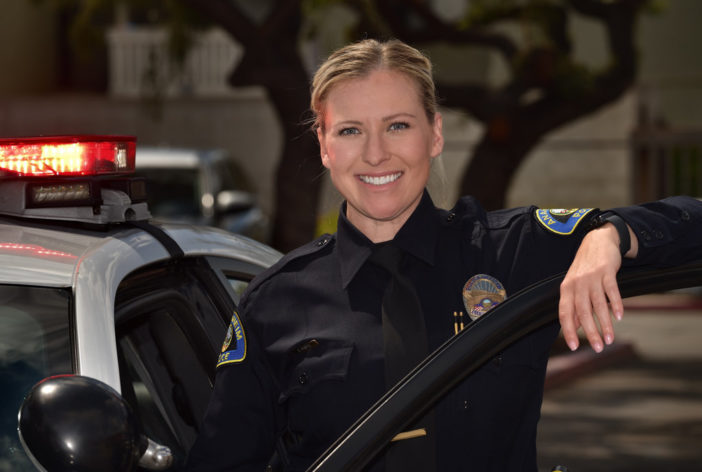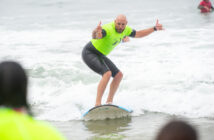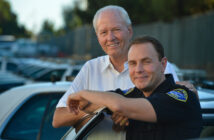With Women’s History Month wrapping up this March 2020, Behind the Badge recently sat down with one of the Anaheim PD’s newest female officers to share her perspective on being a woman in law enforcement.
Officer Brooke Phipps, 32, started her career at the APD as a police officer trainee in January 2018. She now works the weekend (Thursday, Friday, Saturday) graveyard shift out of the APD’s East Substation in Anaheim Hills.
Thirty-two of the APD’s 391 officers are female – 8 percent. While still on probation last year, Phipps ran the Baker to Vegas race as a member of the APD’s all-female team.
The team’s name was, not surprisingly, The Eight Percenters.
With several recent retirements coupled with new hires, the APD has a relatively young group of patrol officers. About one-third of the APD’s 391 officers have less than five years on in Anaheim, said PIO Sgt. Shane Carringer.
Phipps grew up in Corona and went to Corona High School. She went on a softball scholarship to Cal State University, Fresno, where she majored in communications.
At age 29, after working in an office for several years, Phipps decided to become a police officer.
Q. So tell us about your softball-playing days in college.
A. I played centerfield. We won a couple of conference titles. I was team captain my senior year. I was a “slapper” hitter as well as a power hitter. Because I was a fast runner, I usually batted first or ninth.
I never really desired becoming a professional softball player. I was kind of burned out on it. But I would have laughed if you had told me I was going to be a police officer. Growing up, I never even considered it.

“I thought, ‘I don’t want an office job for the next 30 years,'” says Brooke Phipps. “I grew up being active, and sitting behind a desk all day wasn’t my thing. I’m very athletic. I wanted to use that. And I’ve always been a part of a team. I love that mentality.” Photo by Steven Georges/Behind the Badge
Q. Tell us about your family.
A. No one else in my family is in law enforcement. I have an older brother and a younger sister. My dad, Dave Phipps, owns a small business in Anaheim, an industrial supply company. My mother, Tracy, works with him.
Q. So you graduated from college. Then what?
A. I got a job right out of college — a desk job. I worked for a packaging company. We made wraps for such products as Clif Bars. When I graduated in 2010, the economy was bad. There weren’t a lot of options. I worked in Irvine doing this for about seven years.
I was 29, and thought, ‘I don’t want an office job for the next 30 years.’ I grew up being active, and sitting behind a desk all day wasn’t my thing. I’m very athletic. I wanted to use that. And I’ve always been a part of a team. I love that mentality. So that’s what got me thinking, ‘What kind of career applies to me?’
So I called one of my teammates at Fresno State who became a sheriff’s deputy to get her take on females in law enforcement.
Q. What did she tell you?
A. She told me it was the best job in the world. She also told me, ‘I’m not going to lie to you. This is a really tough job.’ But she also told me if she could go back now and do it all over again, she absolutely would. And that stuck with me.
Then I talked to a couple of other friends I knew in law enforcement, and they were very encouraging. They told me, ‘We absolutely see you doing this.’ It took me about a year to kind of make up my mind.
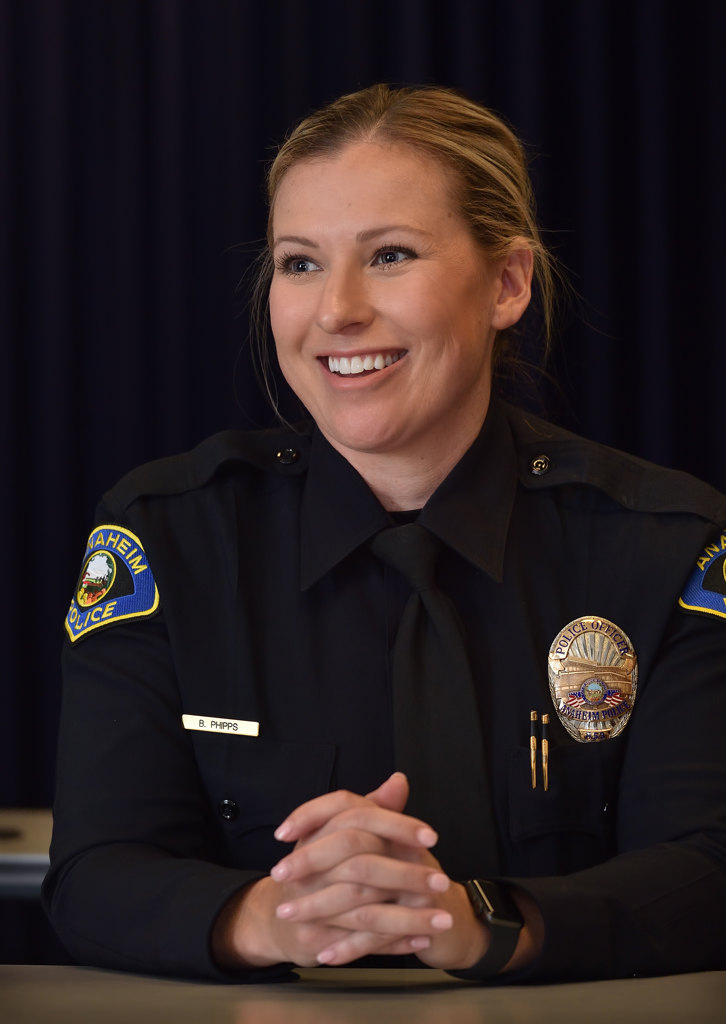
“(The academy) was a great experience,” says Brooke Phipps of the Anaheim PD. “It was also stressful and physically a lot more demanding than I thought.”
Photo by Steven Georges/Behind the Badge
Q. What were some of your concerns?
A. To be honest, I think it was a little bit intimidating. I knew I was going to have to go through physical testing against grown men. But I finally decided, ‘OK, I can do this.’ Then I just really focused on working out and studying different law enforcement materials on my own.
I went through all the testing and I was fortunate enough to get hired by Anaheim, my No. 1 choice.
Q. Why was the Anaheim PD your No. 1 choice?
A. I asked everybody that I knew in law enforcement, and Anaheim was always mentioned in the top two. It has a good reputation and a good-size department. There’s a lot you can do here. You can work on a lot of different details.
Q. You entered the Orange County Sheriff’s Department Regional Training Academy in summer 2017. What was that six-month experience like?
A. When I was considering becoming a police officer, I went on a ridealong with a Huntington Beach officer who was a female, and about my age. She said of the academy, ‘It’s the best six months that you never want to do again.’ And she was 100- percent right.
Q. How so?
A. It was a great experience. It was also stressful and physically a lot more demanding than I thought. But it was a great experience. I was fortunate to have a lot of awesome people in my class, including four other females. We developed a really close bond.
Q. You went through six months of training before going out on your own as a patrol officer in July 2018. How did training go?
A. There is so much support in this department. There were definitely times when I struggled. I think sometimes I was too focused on thinking what my FTO (field training officer) wanted me to do, instead of just doing what I thought was right. I kind of started overthinking stuff.
Q. If a young woman were considering a career in law enforcement, what would you tell her?
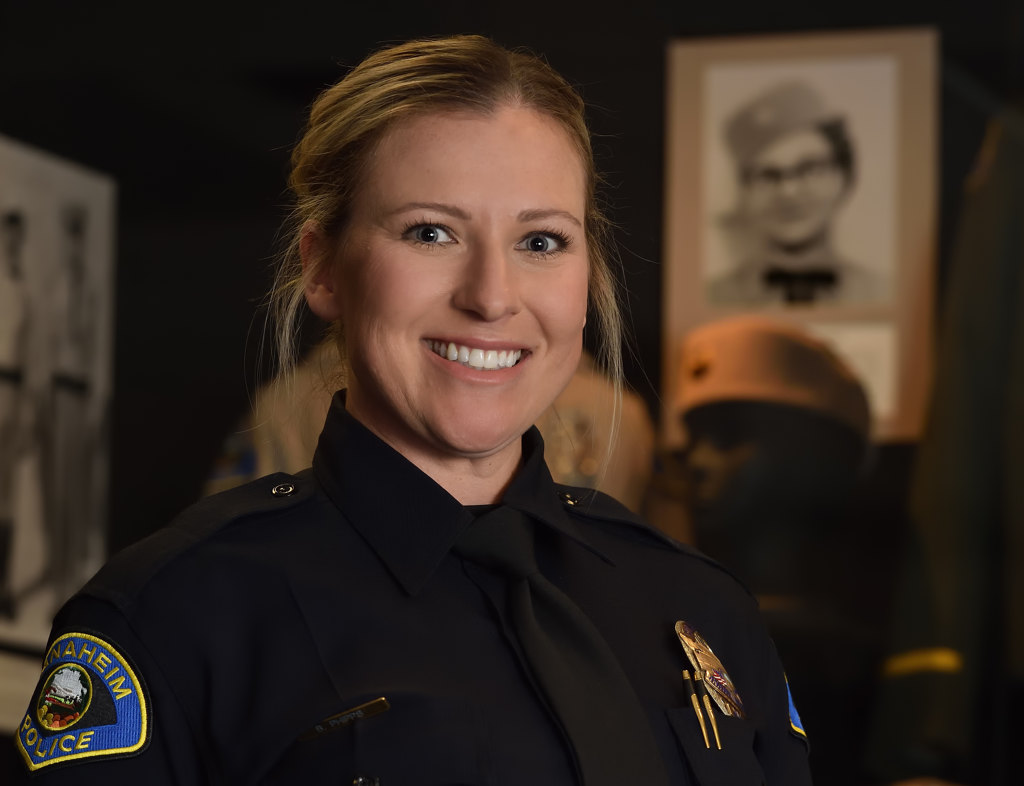
One of Anaheim PD’s newest female officers, Brooke Phipps, stands in front of a display honoring APD Det. Vera Farmer-Wilson, the department’s first female detective.
Photo by Steven Georges/Behind the Badge
A. That I love the job. And that if she thinks this is what she wants to do, go for it. I think this is a great job, but it’s not for everybody – male or female.
The first year or two of going through the academy and starting on the job is really tough. It’s demanding, but I think it’s worth it. It’s a great job, and it’s a lot of fun.
Every day is different. Every call is different. The job is never boring. And I love working with my partners. We experience stuff that nobody else could possibly understand. It’s like a family. I’ve met some really amazing people through this job.
I left my old job because I was stuck behind a desk every day, and it’s nice being able to be outside. I get to interact with people and work with the community, which is awesome.
Q. As a police officer, you have the ability to really make a difference in people’s lives.
A. You hope that what you say and how you treat people makes a difference. Sometimes I think it does, sometimes it doesn’t. But you just try to do the best you can in helping people. This job can be rewarding in that way.
Q. Do you have a career path in mind?
A. I definitely want to do patrol for a while and get a really good foundation. Maybe do patrol for five years. I’m not in a rush to move into any kind of detail. I would like to be a detective someday.
I’ve always had an interest in working with victims of human trafficking. I’ve had a couple interesting calls working with prostitutes. That kind of stuff is interesting to me. And I do feel like being a female, I can talk to those girls about stuff that a lot of my male counterparts can’t.
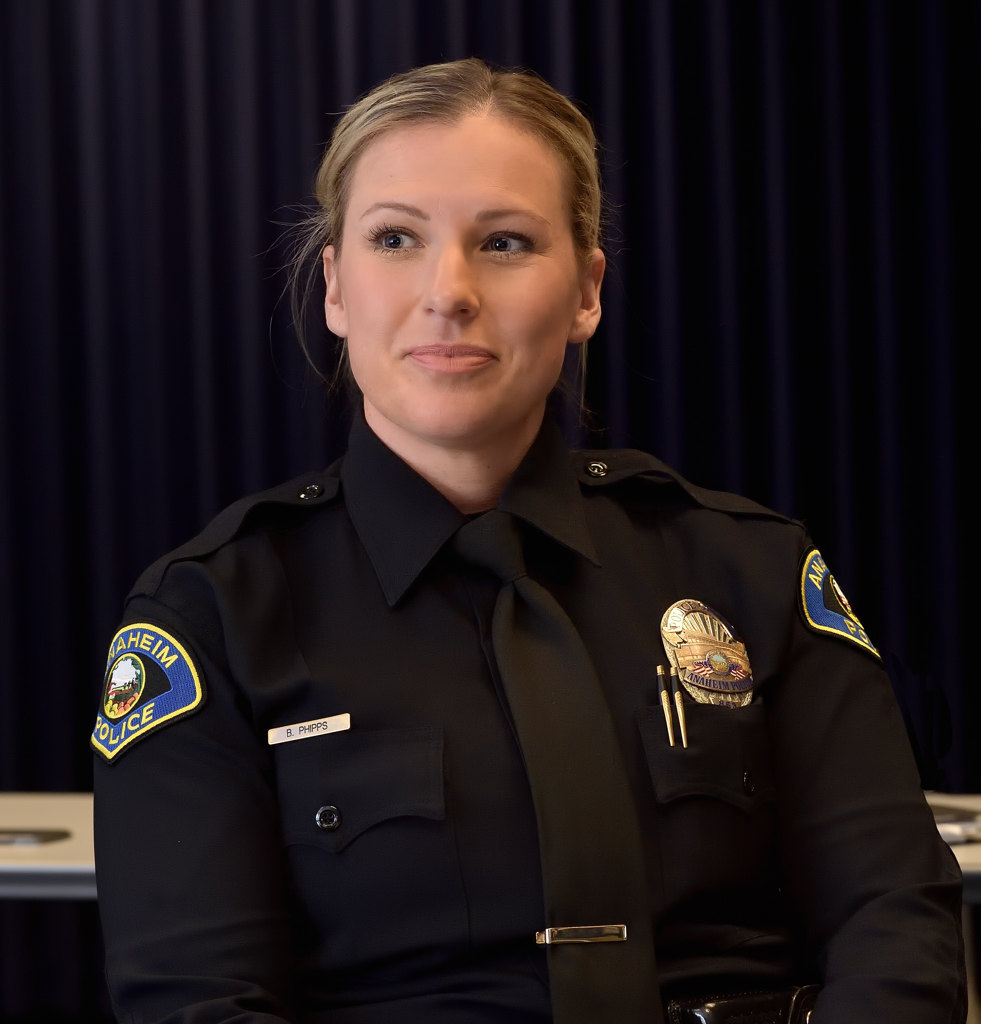
Anaheim PD Officer Brooke Phipps talks about her switching her career to law enforcement and why she chose Anaheim.
Photo by Steven Georges/Behind the Badge
Q. Has the public or have your partners treated you differently because you’re a woman?
A. When I first started on the job, people were like, ‘Oh, you’re a female.’ People are going to test you a lot more being a female. But honestly, I haven’t really noticed a lot of that.
A suspect may want to fight you more because they don’t think you’re capable. A year ago, on one of my shift rotations, I had a female partner. It was interesting, because we’d go on calls and a lot of times we’d have somebody detained and they’d be cooperative and everything was fine.
Then some of my male partners would arrive and immediately that person would get really defensive and uncooperative. I think they (suspects) just have a different demeanor when talking to a female. I get a different response from people, but not all the time.
Q. And what about your male colleagues? You work in a male-dominated profession.
A. I don’t mind it at all. All the guys in the department have been so supportive. I have to be able to do the job just as well as they do. They’re not going to cut me slack. I have to be able to hold my own, too.
Q. Do you see yourself as a role model for younger girls?
A. I’ve had several people come up to me and say, ‘It’s so nice to see a female officer.’ It’s cool meeting little girls because they will say, ‘It’s a girl officer!’ I hope that them seeing me might inspire them.
When I was younger, if I had seen more female officers, I would have thought maybe I could do that — but it never even crossed my mind. But maybe it would have if I had come across more female officers growing up.
Q. What skill sets are necessary to succeed as a police officer?
A. Especially as a female, it’s really important to keep physically in shape and strong and capable. And communication is huge. I think that’s probably one of the biggest things in law enforcement: being able to communicate with people and relate to people.
Life experience also plays a role. We hire a lot of younger officers, but it’s nice having that life experience.
Q. Outside of work, what are some of your interests and hobbies?
A. I live down by the beach, so I love going there. I go running a lot. I’m super close to my family, so I see them a lot.
To stay in shape, I do Orange Theory, which is high-intensity interval training. And I do a little lifting.
And church is really important. I grew up in a Christian home.
Q. Any final thoughts?
A. After two years on patrol, I agree with what my softball teammate told me when she said if she could do it all over again, she would. This job isn’t for everyone, but it’s exactly what I’m supposed to be doing. If I were to go back, I wouldn’t change anything.
 Behind the Badge
Behind the Badge
